 rom
rom rom
romThis is the story of an accidental network of hundreds of people all (sort of) working toward a vague common goal on a ridiculous project that did not exist two weeks ago. The way it started was, last Monday night, goofing around on the web, I found an amazing 2004 blog post by Stevie Nicks, the musician originally from Fleetwood Mac. In the post she managed to unify four disparate themes, namely:
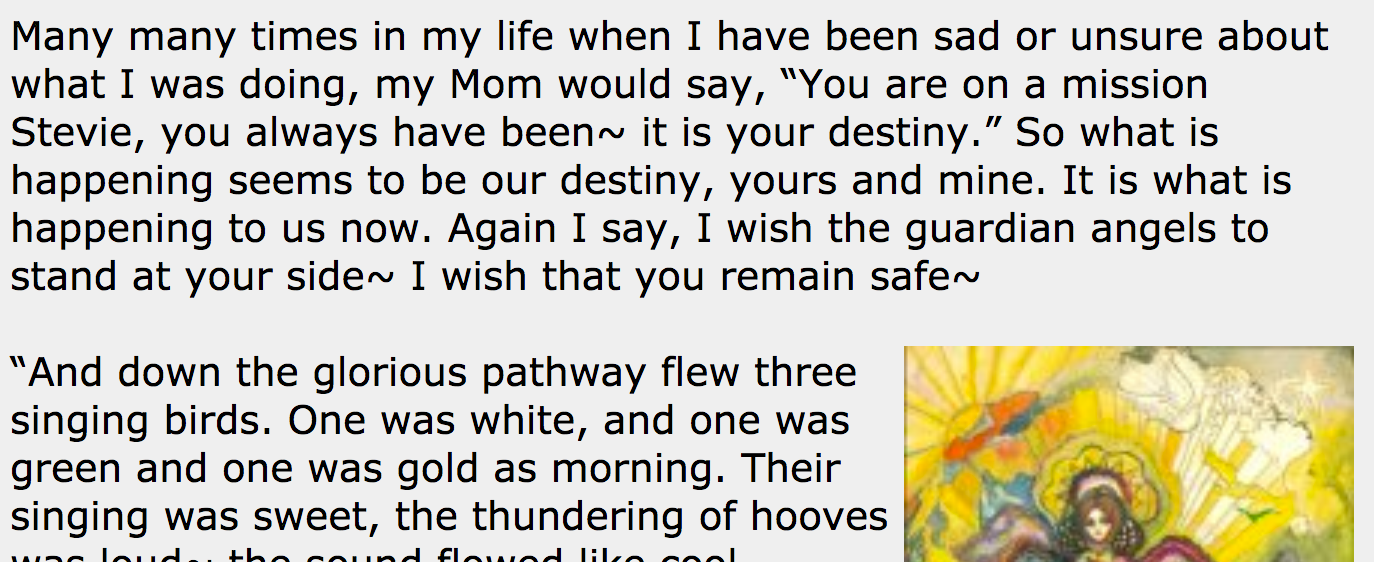 Notice all the tildes.
I was perplexed by the tilde character—“”—that Stevie Nicks uses throughout her writing.
“That’s a west coast thing,” said Mo, who grew up in California. “You use tildes instead of colons or dashes, it’s more like handwriting.”
I shared this fact on Twitter. A website-managing friend of mine promptly wrote back: “tildes are only ever properly used in front of usernames on shared hosting.” Wait, what?
Notice all the tildes.
I was perplexed by the tilde character—“”—that Stevie Nicks uses throughout her writing.
“That’s a west coast thing,” said Mo, who grew up in California. “You use tildes instead of colons or dashes, it’s more like handwriting.”
I shared this fact on Twitter. A website-managing friend of mine promptly wrote back: “tildes are only ever properly used in front of usernames on shared hosting.” Wait, what?So! Back in ye olden Inter-Net tymes of the 1990s, if you were a (then youngish) nerd like me, you’d get an account on some server called CyberFox.net and your web address would be http://CyberFox.net/vixen. (You were “vixen.”) And you could put some web pages at that address.
The early personal web grew up around these little “tilde sites”; that’s what preceded blogging. The “” is a little like the “@” on Twitter—a shortcut that says: “Here is a person.”
By now I was well in the bag and listening to Stevie Nicks (sounds like she’s singing, hoo [baby], hoo [baby], hoo), so I tweeted out, “YES also i _(sic.) _just registered http://tilde.club and will given _(sic.) _anyone a shell account who wants one.”
A “shell account” gives you access to use a computer. When you log in a “shell” program runs that lets you issue commands. This is what hackers type into in movies. From the humble command line you can write things and save web pages. Here is what it looks like to use a Unix machine remotely over a secure shell connection:
 As drab and retro as that may seem, there’s a lot of power and value inside that setup. A few friends fired back: Sure! Or “Yes if serious.”
It was pretty late at night. I had two pieces due for _Businessweek, so I _should have gone to bed right then. No one would have held me to my promise. But look. The kids were in bed. It doesn’t take long to set up computers in the cloud. You can do it even when you’re one or two sheets to the wind. I booted up Amazon’s cheapest and weakest fragment of a cloud computer. You do this by clicking buttons in a web page. I logged in to my new computer, made a few user accounts, and fired up a web server. This computer ran a Unix-based operating system. It was located somewhere in Virginia.
I went to bed. When I woke up 100 people were asking for accounts.
As drab and retro as that may seem, there’s a lot of power and value inside that setup. A few friends fired back: Sure! Or “Yes if serious.”
It was pretty late at night. I had two pieces due for _Businessweek, so I _should have gone to bed right then. No one would have held me to my promise. But look. The kids were in bed. It doesn’t take long to set up computers in the cloud. You can do it even when you’re one or two sheets to the wind. I booted up Amazon’s cheapest and weakest fragment of a cloud computer. You do this by clicking buttons in a web page. I logged in to my new computer, made a few user accounts, and fired up a web server. This computer ran a Unix-based operating system. It was located somewhere in Virginia.
I went to bed. When I woke up 100 people were asking for accounts.
Fine! People like free stuff. I went through all the emails and I gave out 100 more accounts so that 100 more people could make web pages on the little machine. I sent them an email:
Welcome to tilde.club!Who am I? I am the system administrator, Paul Ford. Like any system administrator, I will be slow to respond, will get everything wrong, and will act imperiously while never acknowledging wrongdoing. Consider this part of your authentic tilde.club experience! Since I’ve now saddled myself in this clown rodeo, a few notes: - No drama. What constitutes drama? There is a Mary J. Blige song called “No More Drama.” If Mary J. Blige would think it was drama, it is drama.
- This is a guilt-free project and total disaster is ALWAYS a possible outcome.
- This thing is a de-facto whitey sausagefest so everyone be actively, aggressively cool and sweet and remember that the only binary that’s real is the one that we use on our microchips.
I figured that I should also make some sacred vows, so I added:
MY SACRED VOWS TO YOU
I will do my best to do the following things:
1) I will make a weekly backup of the public_html directories so when some teen in Estonia decides to hack in and ruin everything we can bring up a new server and limp back to life.
2) I won’t shut things down without a month of warning and once it’s shut down I’ll make sure a file with all the public_html directories is uploaded to archive.org.
3) If any community forms at all (DUBIOUS BUT SURPRISE ME) I promise I won’t blow up the community without, like, first pointing everyone to some free IRC channel or something.
People logged in and started live-chatting all-text pictures of dragons to everyone on the computer. Then they switched into their text editors and started to make web pages, right there on the server, just like I’d hoped.
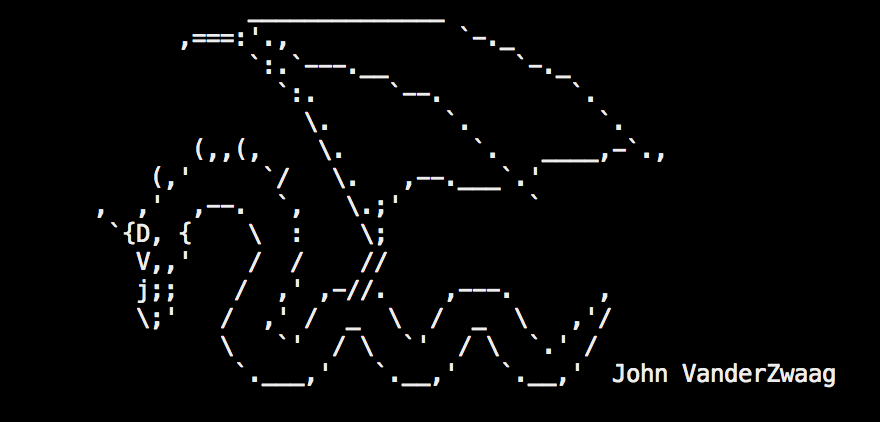 Example dragon
A lot of the pages were purposefully retro and 90's-looking; others were meditations on the meaning of tilde.club. Some pages were stories, some were produced by computer code. Some people wrote code to make order out of the expanding chaos. Then one user made a page that listed the most recently updated pages. Suddenly there was a way to see what was happening, minute-to-minute. I hacked together the bits of a home page.
# Things people made on tilde.club last week
1. Lots and lots of web pages, most of which are jokey and retro, some sincere, and many both. I like the retro ones but I love the ambitious ones.
2. Code that lists who is logged in to the system and code that lists who is using up too much disk space.
3. A webring to connect all the sites. And a literal, 3D, spinning webring.
4. A version of/parody of/homage to the Million Dollar Homepage that wants people to give a million dollars to charity and is now 1/5,000th of the way towards its goal.
5. Multiple very good blogs, some written by hand, some with blogging software, referencing one another, some with “sponsors.”
6. A map of where the users are located on earth that I ironically cannot find right now.
7. An infinite talking cow, an atomized version of Enya, a thing that mashes up hard rock tracks, kind of, and a monster that eats tilde.club pages.
This is what it looks like when people log in to do their experiments:
Example dragon
A lot of the pages were purposefully retro and 90's-looking; others were meditations on the meaning of tilde.club. Some pages were stories, some were produced by computer code. Some people wrote code to make order out of the expanding chaos. Then one user made a page that listed the most recently updated pages. Suddenly there was a way to see what was happening, minute-to-minute. I hacked together the bits of a home page.
# Things people made on tilde.club last week
1. Lots and lots of web pages, most of which are jokey and retro, some sincere, and many both. I like the retro ones but I love the ambitious ones.
2. Code that lists who is logged in to the system and code that lists who is using up too much disk space.
3. A webring to connect all the sites. And a literal, 3D, spinning webring.
4. A version of/parody of/homage to the Million Dollar Homepage that wants people to give a million dollars to charity and is now 1/5,000th of the way towards its goal.
5. Multiple very good blogs, some written by hand, some with blogging software, referencing one another, some with “sponsors.”
6. A map of where the users are located on earth that I ironically cannot find right now.
7. An infinite talking cow, an atomized version of Enya, a thing that mashes up hard rock tracks, kind of, and a monster that eats tilde.club pages.
This is what it looks like when people log in to do their experiments:
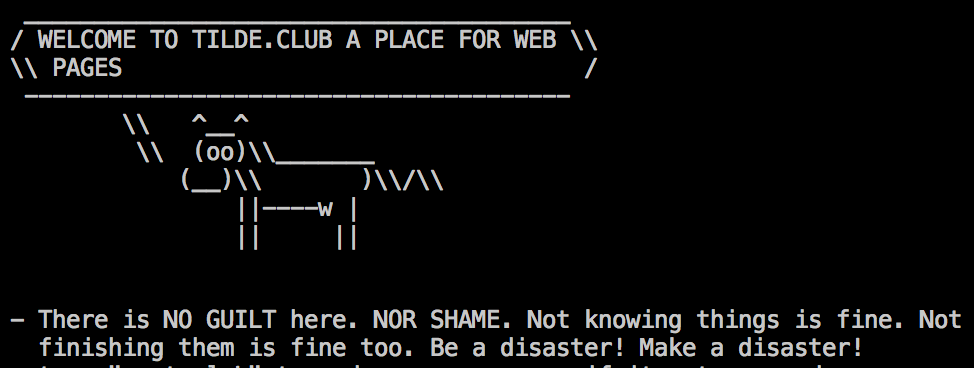 After a couple days I had added 600 accounts or so and the little server began to gasp and wheeze. I had to stop adding people (at least a thousand more have signed up on the waitlist). I said, “If you can help I could use it.”
And hoo doggies. I got dozens of offers of help—systems administration, community moderation, and money. A couple hours later, along with a goodly number of PayPal donations, tilde club member ~danbri arranged to have $24 in an envelope slid under the door of my apartment in Brooklyn.
After a couple days I had added 600 accounts or so and the little server began to gasp and wheeze. I had to stop adding people (at least a thousand more have signed up on the waitlist). I said, “If you can help I could use it.”
And hoo doggies. I got dozens of offers of help—systems administration, community moderation, and money. A couple hours later, along with a goodly number of PayPal donations, tilde club member ~danbri arranged to have $24 in an envelope slid under the door of my apartment in Brooklyn.
 More revenue than most websites I guess?
That’s when tilde.club sort of teetered off the cliffs of folly and into the ocean of, I don’t know, _thingness _or _projectness. _I live pretty far back from the cliffs of folly in a hut of irony and suspicion. It was all pretty new for me.
A few days later user ~jr made a program that drew a graph of the emerging tilde.club social network. This is what that network looks like now:
More revenue than most websites I guess?
That’s when tilde.club sort of teetered off the cliffs of folly and into the ocean of, I don’t know, _thingness _or _projectness. _I live pretty far back from the cliffs of folly in a hut of irony and suspicion. It was all pretty new for me.
A few days later user ~jr made a program that drew a graph of the emerging tilde.club social network. This is what that network looks like now:
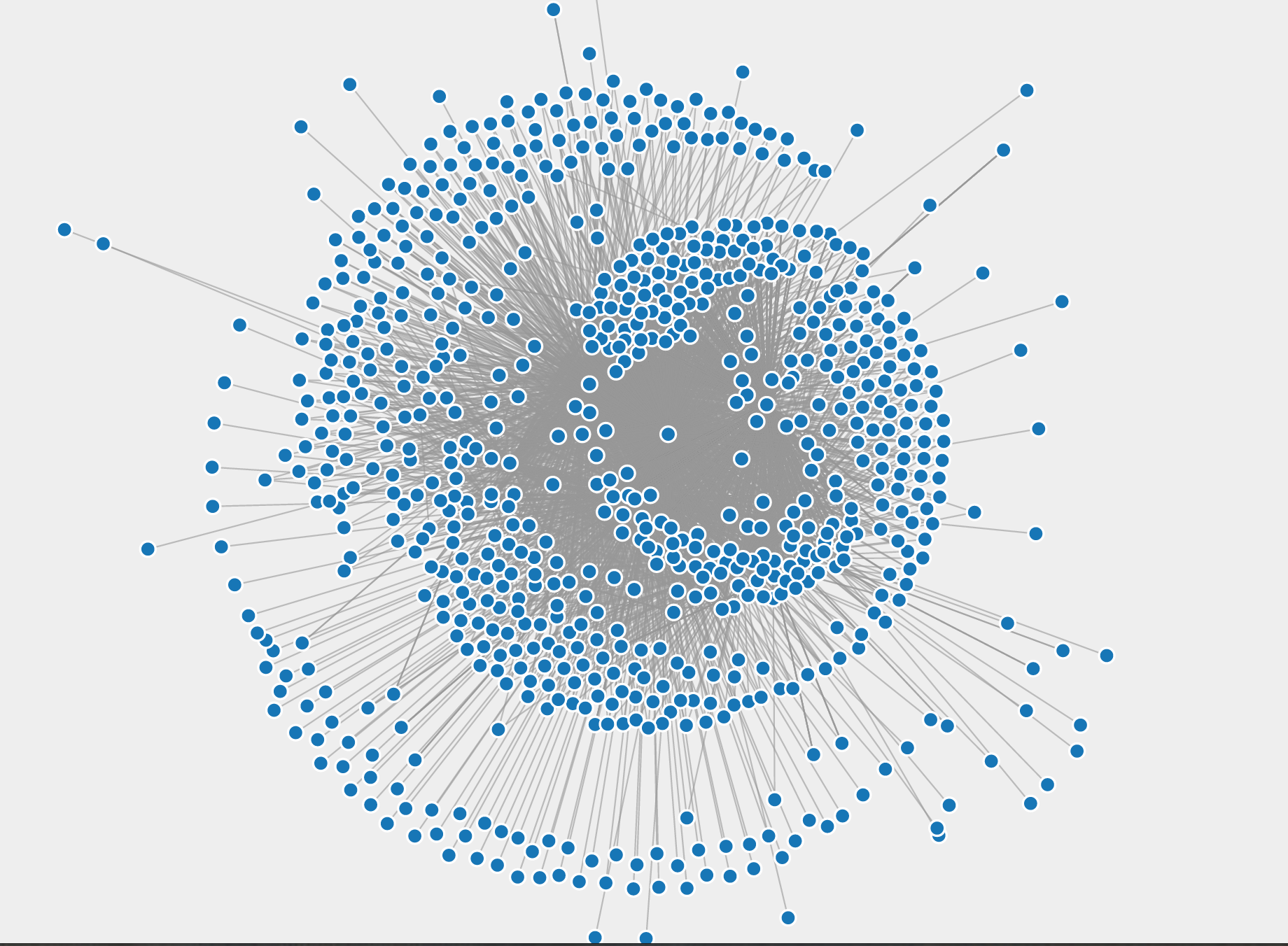 From http://tilde.club/~jr/network/
I mean, look at that thing. Your guess is as good as mine.
# What actually is tilde.club?
In the last week many people have asked me: Is Tilde.Club a social network? Is it a company? Is this a product? A _minimum viable _product? What did you do to _build _it? People have asked to talk with me about it, to interview me about it, and asked for my plans and goals. The site has been listed on Product Hunt, which is a website that itself just received $6.1 million in venture funding, so that it can fully carry out its mission of making a list of other websites that receive venture funding. And to that all I can say is —
> Tilde.club is one cheap, unmodified Unix computer on the Internet.
That’s it. That’s all it is. It is no more than that.
If you look for more for it to be you will find nothing.
Such computers are cheap and plentiful. They take a few minutes to set up and you launch them from a web browser and rent them by the hour. And even more importantly:
> As a human being reading Medium, you are not expected to worry about, write think-pieces about, or concern yourself with tilde.club.
There is no hurry to join. There is no business model, no relevance for brands and nothing to optimize. The site does not compete with anything—for it is just a single computer like millions of others. There is no need to get in on the ground floor, because the ground floor has been there for decades.
> Tilde.club, like all dubious products, is clearly marked:
From http://tilde.club/~jr/network/
I mean, look at that thing. Your guess is as good as mine.
# What actually is tilde.club?
In the last week many people have asked me: Is Tilde.Club a social network? Is it a company? Is this a product? A _minimum viable _product? What did you do to _build _it? People have asked to talk with me about it, to interview me about it, and asked for my plans and goals. The site has been listed on Product Hunt, which is a website that itself just received $6.1 million in venture funding, so that it can fully carry out its mission of making a list of other websites that receive venture funding. And to that all I can say is —
> Tilde.club is one cheap, unmodified Unix computer on the Internet.
That’s it. That’s all it is. It is no more than that.
If you look for more for it to be you will find nothing.
Such computers are cheap and plentiful. They take a few minutes to set up and you launch them from a web browser and rent them by the hour. And even more importantly:
> As a human being reading Medium, you are not expected to worry about, write think-pieces about, or concern yourself with tilde.club.
There is no hurry to join. There is no business model, no relevance for brands and nothing to optimize. The site does not compete with anything—for it is just a single computer like millions of others. There is no need to get in on the ground floor, because the ground floor has been there for decades.
> Tilde.club, like all dubious products, is clearly marked:
_For entertainment purposes only._ If you are respectful of others, you will be welcomed, and people will be excited to see your web pages and to meet you. This is not a special characteristic of tilde.club; this is a basic characteristic of decent humans that somehow has become atypical on the Internet. I’m having trouble communicating all that, though. My guess is people just aren’t used to hearing it. So I repeat, over and over: > Tilde.club is one cheap, unmodified Unix computer on the Internet. # I’m truly sorry, but this is the part of the essay with the potted history of _Unix_. Unix is an operating system. An operating system is the set of programs that runs on computers so that _other_ programs can run. It got off the ground in the early 1970s at Bell Labs, back when America had one big phone system, and it has been continually growing in use since then. Unix is a set of very small computer programs that have been stitched together into a stable agglomeration over the years. These are layered on top of a “kernel” that organizes the insanely fast power of the computer into a set of abstractions that humans can handle. Its dedication to this small-is-beautiful approach makes Unix as much a philosophy as a technology. You could say that about any technology, but Unix owns up to it. (If you’re curious, grab a copy of _[The Unix Programming Environment_](http://www.amazon.com/Programming-Environment-Prentice-Hall-Software-Series/dp/013937681X), which is an exemplar of plain technical diction, sort of a Strunk & White of computing.) Unix comes in many versions and derivations, and many of them are totally free of cost. Linux is the most popular free derivation, and that’s what tilde.club runs upon. 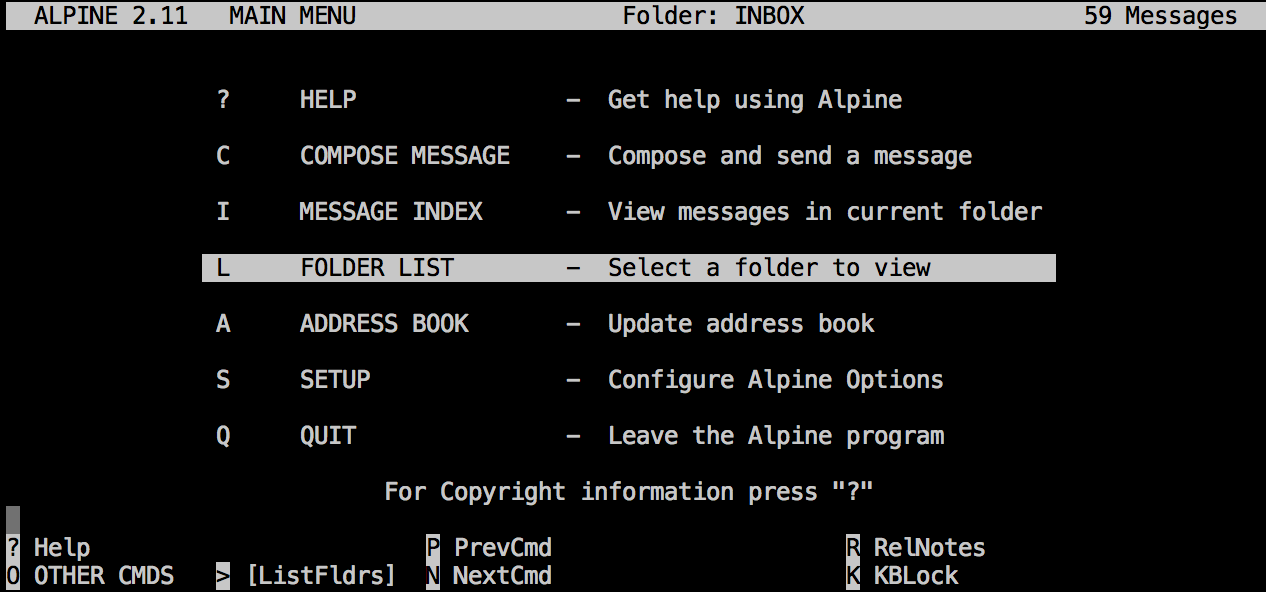 This is where young people shared feelings In the 1970s and 1980s Unix migrated out of research labs and found a home in academia. Thus many people who went to college in the 1980s or early 1990s have memories of learning it in order to check their email. Many also remember its cousin, VAX/VMS. Undergrads would walk to a terminal—often just a monochrome screen with a keyboard—log in to their account, and type a command to read their email. The computer was elsewhere, across campus. Since there were other people on the computer, you could chat with them and send them mail. You could also send mail to other people outside of your local machine, outside of your local network, out to the “Internet.” You could connect to other computers on the Internet and use them as if you were right in front of them. I remember finding out about this and being incredibly freaked out. I remain freaked out. In the 1980s people stopped sharing machines, probably for the same reason that people in decades prior stopped taking buses and streetcars and instead drove cars. A “personal computer” became a possibility — and the PC industry exploded into a huge sector of the world economy. Then—there are many different ways to tell the story of those years; I am just trying to tell one strand of the story of computing—some of us took our computing lives from our Unix machines to our Macs and Windows PCs. We left the server programs running, though. Those programs that give us our email, that permit us to chat. Unix kept running as a server, a historical artifact, as everyone went onto Windows, and to a lesser degree, the Mac. Fast forward 20 years: Your typical “cloud” Unix server, designed in the 1970s to be a very social place, is today a ghost town with one or two factories still clanking in the town square—factories that receive our email, or accept our Instagram photos and store them, and manage our data. But there’s no one walking around and chatting downtown. Thus when people talk about “cloud computing” they are talking about millions of tiny ghost towns. Ironic, because what do people build on these ghost towns but social networks. In the last decade, social networks like Twitter, LinkedIn, Facebook—even Google Plus—appeared. They tried to bring all those lonesome folks back together, into one enormous room. Not just a few dozen people on one computer but millions, even a billion people all sharing one giant meta-computer. Many of those services make very heavy use of Unix under the hood. So: We collectively took a very social computing platform, papered over its social parts, and used it to build a social computing platform. Purely for kicks, I decided to turn the social part back on and throw a nerd party. # Back to tilde.club: Growth, hacking After six days I braced myself and logged in to see my bills for this insanity. Six hundred people running around going crazy making web pages. And it was as bad as I’d imagined. Here is a screenshot:  Servers may now be cheap but people are the same. Some sent me emails like “username zergblaster” and nothing else, because they have been taught that the web is a robot that dispenses things for their pleasure. These people are kind of useless, but it’s okay, maybe we’ll help them learn HTML. Many, many_ _more people wrote me about how much they missed the old web, that sense of quiet and intimacy and patient thought—writing, coding, and learning as they went. This made sense to me, because I miss it too. The modern social web is a miracle of progress but also a status-driven guilt-spewing shit volcano. (Then again, without Twitter no one would know about tilde.club.) Back in the 1990s—this will sound insane—some of us paid a lot of money for our tilde accounts, like $30 or $40 a month or sometimes much more. _We paid to reach strangers with our weird ideas. _Whereas now, as everyone understands, brands pay to know users. I’d taken this thing on myself and was paying to keep it going. But look at it another way: I was getting paid _in_ web pages. I am a man who loves web pages. Not an activity feed, not structured tweets or organized blog posts, no brand messages, just pure raw weird signal. Like walking down a street in a new city at night and seeing all the signs, blinking and bright and in languages you don’t quite understand. You may not love that sensation. I love that sensation. I suppose other people do too, because so many of them were making web pages. Many saw it as an exercise in nostalgia. Others saw it as a way to return to the first principles of the web and think about other ways things could go. 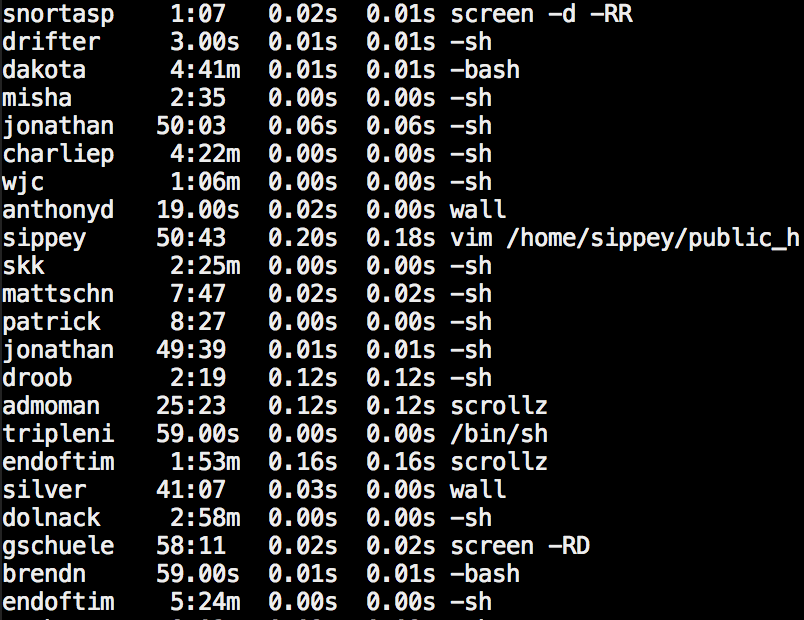 A list of about one-third of the people logged in right now—PARTY IN TILDE TOWN!!! # This will go pear-shaped but we like pears The server will—already has been—abused, by both the poorly-intentioned and the well-intentioned-but-untutored. I keep thinking of all the disasters headed my way. Bad user behavior, threats, denial-of-service attacks, hacking, fork bombs, obsessive rage and threats of violence against myself or my loved ones. But then I remember that I’ve dealt with all of them before, they’re just part of doing things on the Internet. We’ll just make a lot of backups and when disaster occurs we’ll limp forward. Or give up! Always an option worth preserving. We have great volunteer sysops, people who pitched in for the hell of it. I haven’t been able to even email them all yet, or help them find roles. You’d be surprised: There’s a therapeutic quality to administering computers; it can be quite relaxing to keep a system ship-shape. The core team that jumped in and is doing much of the administrative work is [~delfuego](http://tilde.club/~delfuego), ~[harper](http://tilde.club/~harper), [~dphiffer](http://tilde.club/~dphiffer), [~david](http://tilde.club/~david), [~pepper](http://tilde.club/~pepper), and [~jessamyn](http://tilde.club/~jessamyn), with [~rusher](http://tilde.club/~rusher) advising on Unix internals and cultural history. All of them looking at a single cheap web server. Thus a few days ago this all shifted from “joke” to “ridiculous experiment,” from “I” to “we,” and from “mine” to “ours.” # What next? People have already started to reproduce tilde.club on their own servers. [We’re documenting what we learn](https://github.com/tildeclub/tilde.club) so more people can jump in if they want to. And I’ll admit, with all those emails and the money sliding under the door—for a few hours I began to have grand visions of what this could become. _What if_, I wondered, _what if this tiny joke could through some magic grow into a giant decentralized system of cheap and secure Unix servers spread humming away in homes, schools, and across various clouds, machines that people could use for learning and teaching. What if we just built some tiny tools on top of Unix so tilde.club could somehow be used to supplant—even just a little—the commercial social networks of today?_ Then the server crashed. A good reminder. _Tilde.club is one cheap, unmodified Unix computer on the Internet. _And to be clear: I would be shocked if this project touched more than a few thousand or hundred thousand individuals. I’d be amazed if more than one or two or a couple hundred small, tight-knit, mutually supportive independent communities could arise from something like this. And numbers like those just don’t mean much on the modern web, [where you need ten million users](http://cdixon.org/2012/08/03/ten-million-is-the-new-one-million/) before you catch a venture capitalist’s fancy. It’s not like you can build the next Facebook or Twitter or Google on top of a huge number of Internet-connected Linux servers. Sure, Facebook, Twitter, and Google _are_ built on top of a huge number of loosely connected Linux servers. But you know what I mean. Other questions I’ve been asked are: How popular is this site? How many visitors? How many pages viewed? But the only statistics I’ve seen are those the users created themselves—number of users logged in, number of blog posts updated, and so forth. I have no idea how small or big tilde.club is on the larger web. I set up the server, so I suppose I could check the log files and find out which web page, or which tilde.club member, is the most popular. Honestly, though, who cares? I just want to see new web pages get made.-"Tilde.Club: I had a couple drinks and woke up with 1,000 nerds"